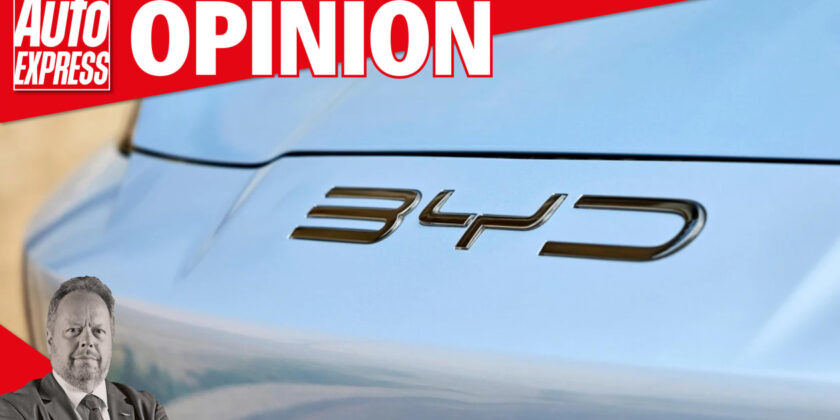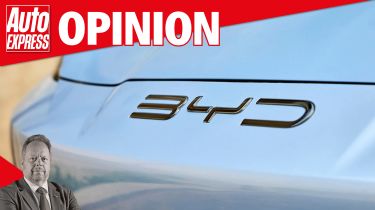Dr Andy Palmer sees the dramatic rise of BYD as just the start of huge, China-driven change on the car manufacturing scene
Regular readers of this column will not be surprised to learn that the automotive landscape has been undergoing a seismic shift. At the epicentre of this transformation is China. For the first time in history, BYD, a Chinese automaker, has outperformed the German giant, Volkswagen, to become China's best-selling car brand. This unprecedented development raises crucial questions about the future of the global auto industry and indeed its wider geopolitical implications.
But we musn’t ignore the fact that state subsidies have played a pivotal role in propelling China's electric vehicle manufacturers to the forefront of the global car industry. The Chinese government has long recognised the strategic importance of EVs, both for their environmental benefits and as a means of promoting indigenous innovation. Consequently, Chinese policymakers have been fostering a favourable environment for domestic EV manufacturers, such as BYD, through a combination of generous subsidies, tax incentives, and regulatory support. Something that its competitors, and certainly the UK, haven’t been able to match.
‘Not every car manufacturer will survive the Chinese revolution’
The rise of BYD has been nothing short of meteoric. Founded in 2003, the company initially focused on producing batteries for mobile phones before sensing the shift towards electric vehicles and moving its attention accordingly. Today, BYD is not only the leading car brand in China, but also one of the largest EV manufacturers in the world.
While China's homegrown automakers are surging ahead, their counterparts in the US, UK, and EU are grappling with various challenges. In the United States, the auto industry is undergoing a period of consolidation and restructuring, with traditional giants like General Motors and Ford trying to find a place in the EV market. Meanwhile, Tesla continues to be a dominant force in the electric car sector, although it faces increasing competition from both domestic and international players and question marks about its accessibility due to price.
Across the pond, European carmakers are also experiencing a significant transformation. Although stalwarts like Volkswagen and BMW have made substantial investments in EV development, they are still playing catch-up with their Chinese counterparts. The UK, on the other hand, is witnessing a worrying and depressing decline in fortunes as the government seems to have run out of ideas on how to attract a battery-manufacturing industry to the country and therefore putting the entire future of the UK car industry at risk.
China’s rise has several far-reaching consequences for the global auto industry. Firstly, it heralds the end of an era, marked by the dominance of traditional automakers from the US, UK, and EU. As Chinese companies like BYD continue to gain market share, it is likely that the balance of power in the global auto industry will shift decisively towards the East. Let’s not forget South Korean giants Hyundai and Kia are also investing heavily in EVs and their government are supporting them.
Secondly, the rise of China as a dominant player in EV manufacturing could exacerbate existing geopolitical tensions. As the world's largest emitter of greenhouse gases, China has a vested interest in promoting the widespread adoption of electric vehicles. However, given that many vital components of EVs, namely batteries, are manufactured in China, officeholders in London, Washington DC, Berlin and Brussels may be wary of ceding too much control to Beijing.
Finally, the rise of BYD and other Chinese EV manufacturers could have a profound impact on the global supply chain. With China accounting for a growing share of the world's EV production, it is conceivable that the country will exert greater influence over the supply of critical raw materials, such as lithium and cobalt, which are essential for manufacturing EV batteries. This, in turn, could lead to heightened geopolitical competition over access to these strategic resources. All of this occurring with the backdrop of rising tensions between China and Taiwan.
Ultimately, the rise of BYD as China's best-selling car brand signals a fundamental shift in the global auto industry. With state subsidies playing a crucial role in bolstering domestic EV manufacturers, it is clear that China's automotive ambitions extend far beyond its borders. As the balance of power in the global auto industry tilts East, the ramifications for both the industry and geopolitics could be profound.
Click here for our list of the best electric cars on sale…
Source: Read Full Article



 ‘Not every car manufacturer will survive the Chinese revolution’
‘Not every car manufacturer will survive the Chinese revolution’